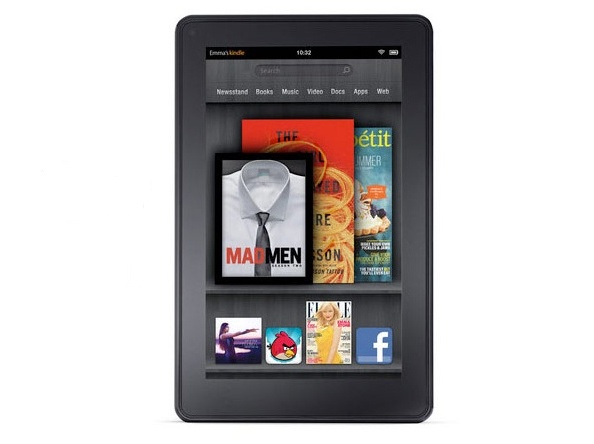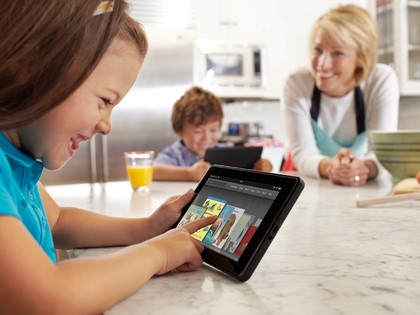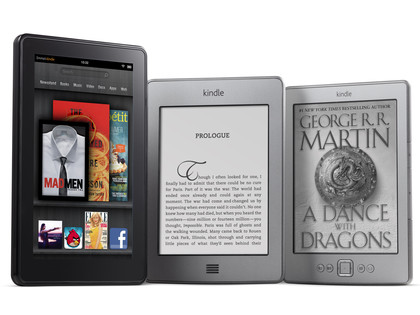Amazon Kindle Fire tablet officially announced

After months of speculation, the Amazon Kindle Fire has been officially announced at an event in New York, marking the first time the company has entered the tablet market proper.
The successor to the Amazon Kindle is a 7-inch device that comes with Android, albeit a version that has been heavily altered by Amazon to make the best use of the company's e-shopping spine.
The screen is an IPS display that's made from Gorilla Glass, it houses a dual-core processor, and weighs in at 14.6 ounces (413g).
There is a tablet-optimised shopping app on board - this is said to comprise simplified and streamlined pages, so it is easier to buy stuff on than the actual Amazon website.
There is a search bar at the top of the UI that allows you to search the Kindle Fire, the web or the Amazon store.
You will be able to multi-task on the tablet too - so listening to music and reading at the same time is possible. You can switch between actions by bringing a screen down from the UI.
When it comes to Amazon Kindle Fire specs, Amazon has decided that a number of things are not needed on the tablet which are found on other Android tablets.
Sign up for breaking news, reviews, opinion, top tech deals, and more.
There is a lack of camera, a microphone or 3G, but there is Wi-Fi on board. Those who purchase the Amazon Kindle Fire will be given a 30-day trial with Amazon Prime.
There will be a number of apps accessible on the device, including Pandora, Twitter, Facebook and Netflix.

The biggest news is how much it will cost. The Amazon Kindle Fire price has been set at just $199, way below the price of any of its rivals.
Amazon has been laying the foundations for an Android tablet for some time now. Back in March it launched a rival to the Android Market.
Called the Amazon Appstore, the site has managed to tempt people away from Google's own web store by offering a number of exclusives.
Couple this with the Kindle e-book store and the general Amazon e-shop and the tablet is a portable storefront for many a web purchase.
Amazon has said the Kindle Fire will have access to 100,000 movies and TV shows, 17 million songs, access to the Amazon Appstore and Kindle books.
You will also be able to peruse full colour magazines - and you don't have to worry about space either, as you will be able to house all the content for free through Amazon cloud Storage.
Amazon has also created a new browser for the Kindle Fire. Called the Silk browser, it harnesses Amazon's cloud computing service to make browsing the web a speedier experience - offloading some of the harder CPU-heavy tasks to the cloud and giving the end user the best performance.
Amazon is calling this a split browser, which offers up an uber-caching solution - so your favourite websites (and sections of websites) will load up much faster than newer content.

This is something that Amazon CEO Jeff Bezos believes is the key to the Amazon Kindle Fire, saying to Business Week about the tablet: "We don't think of the Kindle Fire as a tablet. We think of it as a service."
At the event in New York, Bezos noted that the Kindle has succeeded when most people thought it would fail, with the sales of e-books rising exponentially but also the sales of real books rising as well. He called this the 're-inventing of the book'.
Amazon also announced the arrival of the Kindle Touch - a touchscreen version of the Amazon Kindle. It uses the same IR technology as the Sony Reader- and it's the cheapest Kindle yet, which will retail at $79.
As of yet the Amazon Kindle Fire UK release date is still unknown - Amazon has told us this was a US launch - but we for one can't wait to play with (the) Fire.

Marc Chacksfield is the Editor In Chief, Shortlist.com at DC Thomson. He started out life as a movie writer for numerous (now defunct) magazines and soon found himself online - editing a gaggle of gadget sites, including TechRadar, Digital Camera World and Tom's Guide UK. At Shortlist you'll find him mostly writing about movies and tech, so no change there then.